AP Psychology Resources for Unit 5 Cognitive Psychology
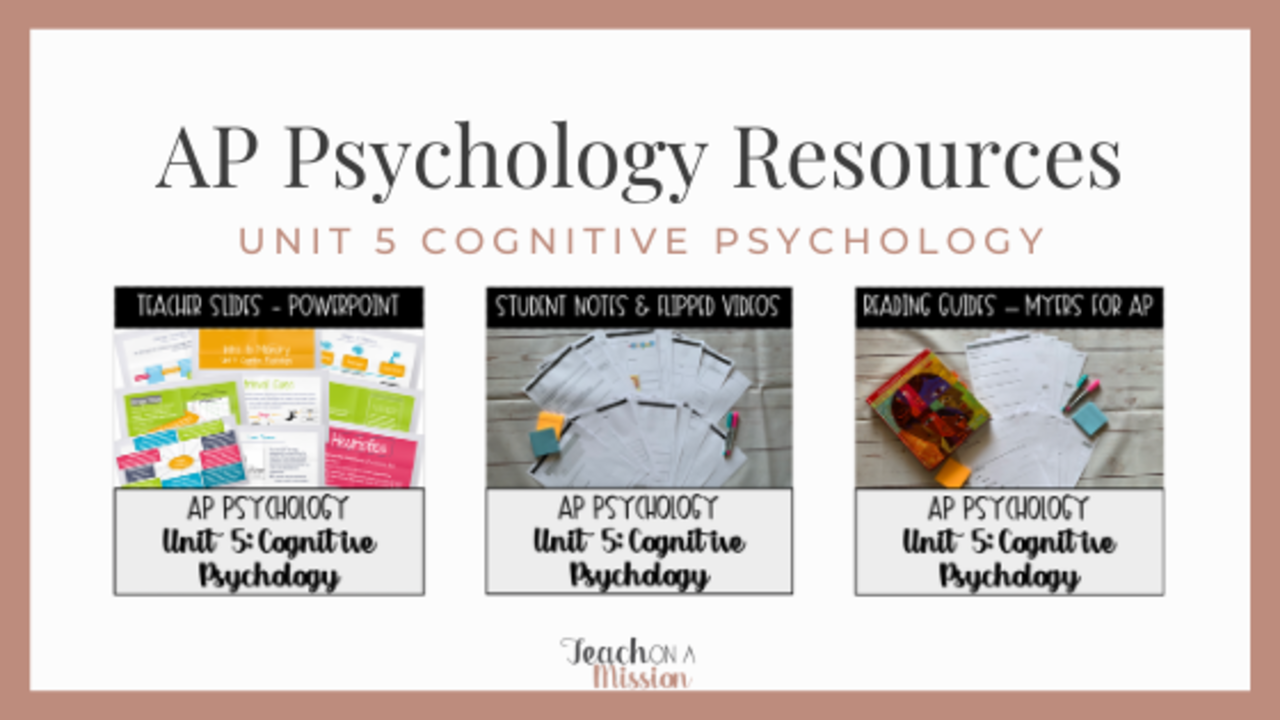
Phew! Cognitive Psychology is a beast! Seriously, CollegeBoard took what was already a huge unit that included encoding, storing, retrieval (of memory), forgetting, thinking, and language, and added intelligence to it. Not just intelligence though... all intelligence theories, no doubt, and psychometrics and measuring of intelligence. These are not simple concepts to wrap one's mind around.
If you are a newer AP Psychology (or non-AP Psychology) teacher, this unit can just about deflate any energy you have left as you come into some difficult weeks of the school year around the holidays.
I want to help you.
The BIGGEST piece of advice I can give you is to ORGANIZE students' thinking in this gigantic unit. Organize the unit into cohesive subcategories that are formatively assessed, showing students the "map" so to speak of the whole unit. I was always quick to show students the calendar each day in class so they understood what topic we were on, where we had been, and where w...
AP Psychology Resources for Unit 4 Learning
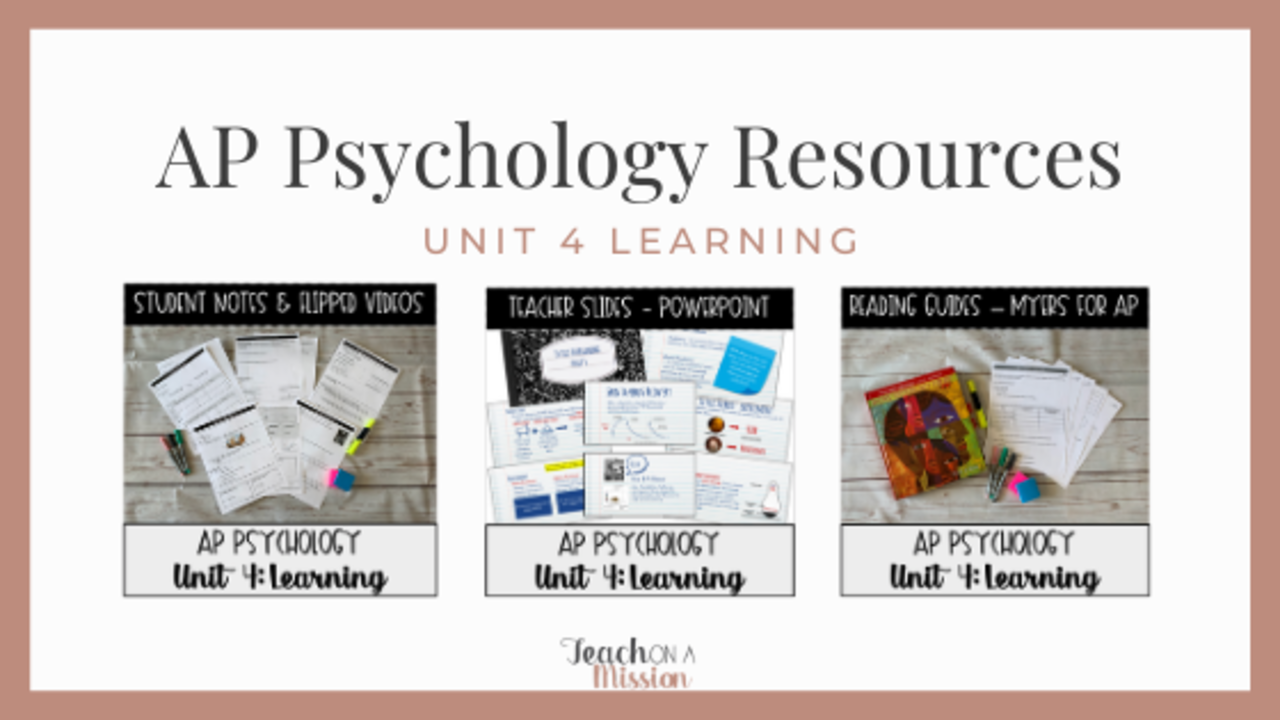
Ok, let's get real. Learning is hard.
Not just that... the statement, "learning is hard" takes on a whole other meaning in psychology, because it's an entire unit!
Not to mention it's not about the stuff you might think of when you say "learning" - stuff like memory and studying... o no, that all goes in the next unit, Cognitive Psychology... stay tuned for that post.
So let's chat about learning and how you might use your time on Learning effectively so students get all the rather confusing terms adjusted in their brains correctly the first time.
Unit 4: Learning
Introducing Classical Conditioning and Operant Conditioning to your students is best done slowly and with examples. I mean visual examples where students can work through the principles of classical conditioning at their own pace. My favorite video to use is this one where a sister conditions her brother- it seems to resonate with students, especially those with younger siblings.
Before you get to examples those, b...
AP Psychology Resources for Unit 3 Sensation & Perception
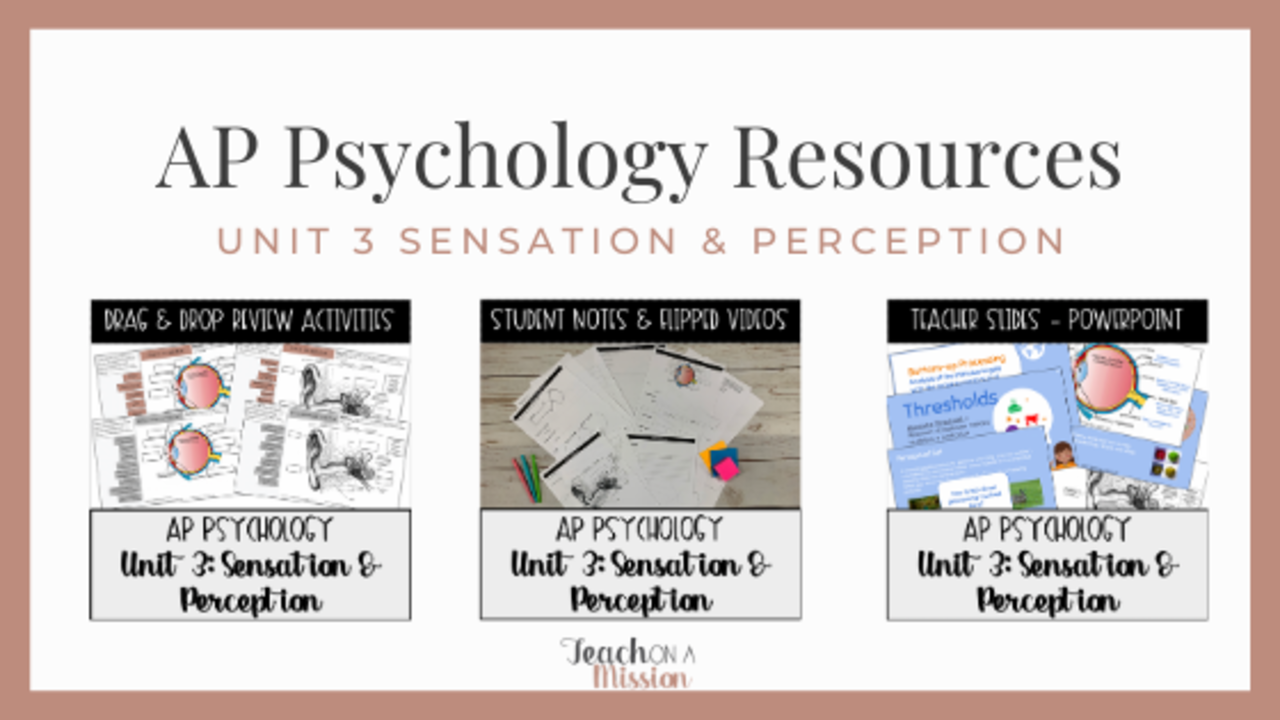
By this time of year, no matter what you teach, you are rolling right along in content yet only holding on for dear life through the awfulness that is October, November, and December when it comes to having motivation and patience. Remember, you can do this!!
Seriously, this time of year is hard. It's hard because there is not really a chance to come for air in the near future. You just have to keep your head down and keep at it. That's why I hope to provide you with resources that are quality, reliable, and engaging for your students in AP Psychology.
Unit 3: Sensation & Perception
Sensation and Perception is also a large unit, meaning lots and lots of vocabulary and new concepts, but it's not necessarily worth it's weight in vocab terms.
Here's what I mean... Sensation & Perception is dense, but it's not big. It's percentage of how many questions on the test will be dedicated to this unit is not as high as biological bases or cognitive psychology, for instance. The lesso...
AP Psychology Resources for Unit 2 Biological Bases

Once you've set up your course and laid the solid foundation that is Unit 1 Scientific Foundations, it's time to take a bit of a turn into a more anatomy-focused unit. One that I've always called "sciency" because of the focus on, well, science.
It's easy to get trapped in the tunnel of "What do I cover? What don't I cover?"... more like a black hole you could spend three weeks in.
My biggest advice is to be sure you are focused on the standards as laid out by College Board's CED, and don't stray too far from that because then, you're just wasting time.
As with the first unit, I want to provide you AP psychology activities and resources in hopes that you get to focus your time elsewhere in being effective with your students - you are the number one influence on their learning after all. So let's get to it.

Unit 2: Biological Bases
Whereas Unit 1 was focused on history and the mathematical basis of psychological research, Unit 2 is focused on the biological science of psychol...
AP Psychology Resources for Unit 1 Scientific Foundations
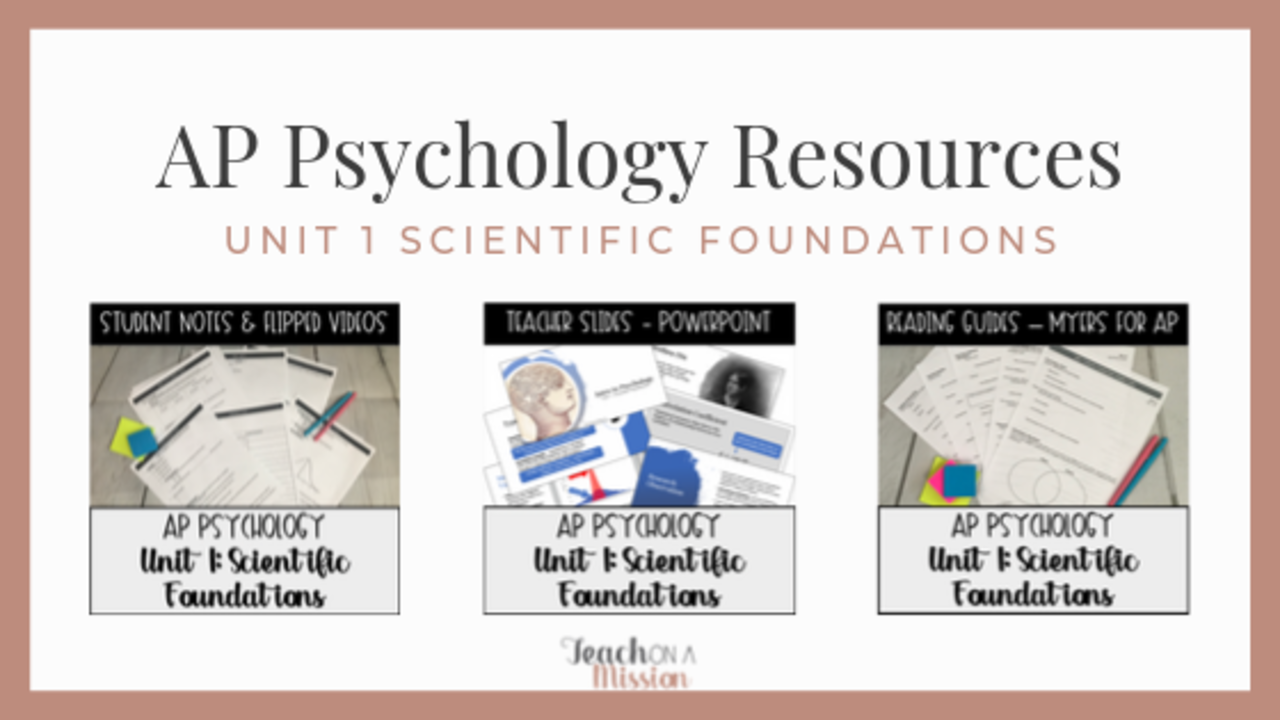
Psychology is such a unique subject that makes for an incredibly unique course for students today. So unique that no certification in any of the "core" subjects (you know, math, english, social studies, and, yes, even integrated science) prepares teachers to teach.
But that's not necessarily bad, it just means we need a little more assistance and support when we go to teach this course. Not that we don't need that support in other, less unique courses (I'm thinking like an American History, which I taught for a couple years), but for unique courses like psychology (and human geography, for instance), the extra support makes a world of difference as we try to learn the content as we teach it.
As I wrote about in a previous post, my hope is to give you that support through quality, effective resources, and possibly even coaching.
But let's take it one unit at a time. And, let's start with the first unit... Scientific Foundations. I will provide you AP psychology activities and res...
How the Flipped Classroom Changed Everything For Me
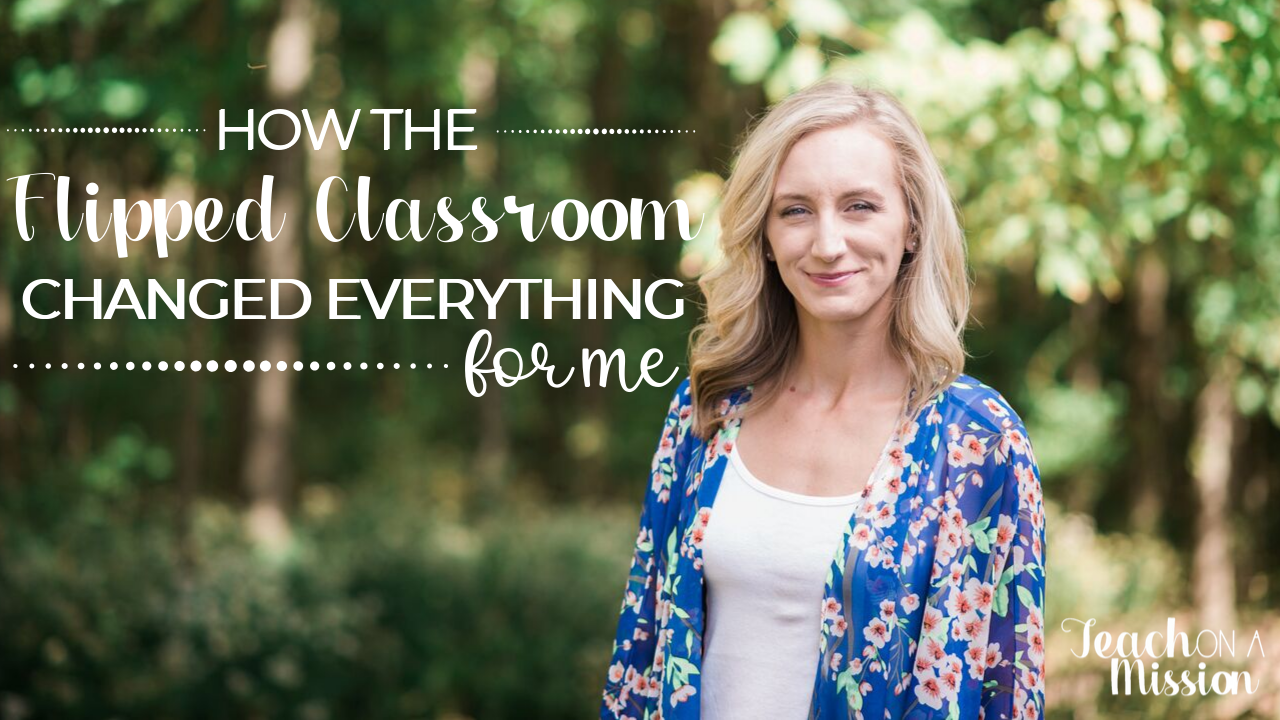
I've been thinking about this post for a while and how to go about writing it. Better yet, I've been thinking about all of the things I'd like to include in it because it's hard to put the words together to describe how the flipped classroom changed so much for me.
To me, flipping is such a simple idea. Just flip how you deliver the content with what is traditionally homework, and you've done it. But I guess that's a bit of an oxymoron to say that flipping something on its head is simple.
Truly it is simple, and so are clear results you'll see in your classroom and your students. But the process of making it happen, once I step back and think of all that goes into it, really isn't the simplest process in the world.
And that's why I want to support you on your journey of flipping your classroom. It's not an easy journey. It certainly wasn't easy for me when I took on the task on my own about nine years ago, and that's not something I want for you.
I have the data to show the...
3 Must-Have Flipped Classroom Procedures
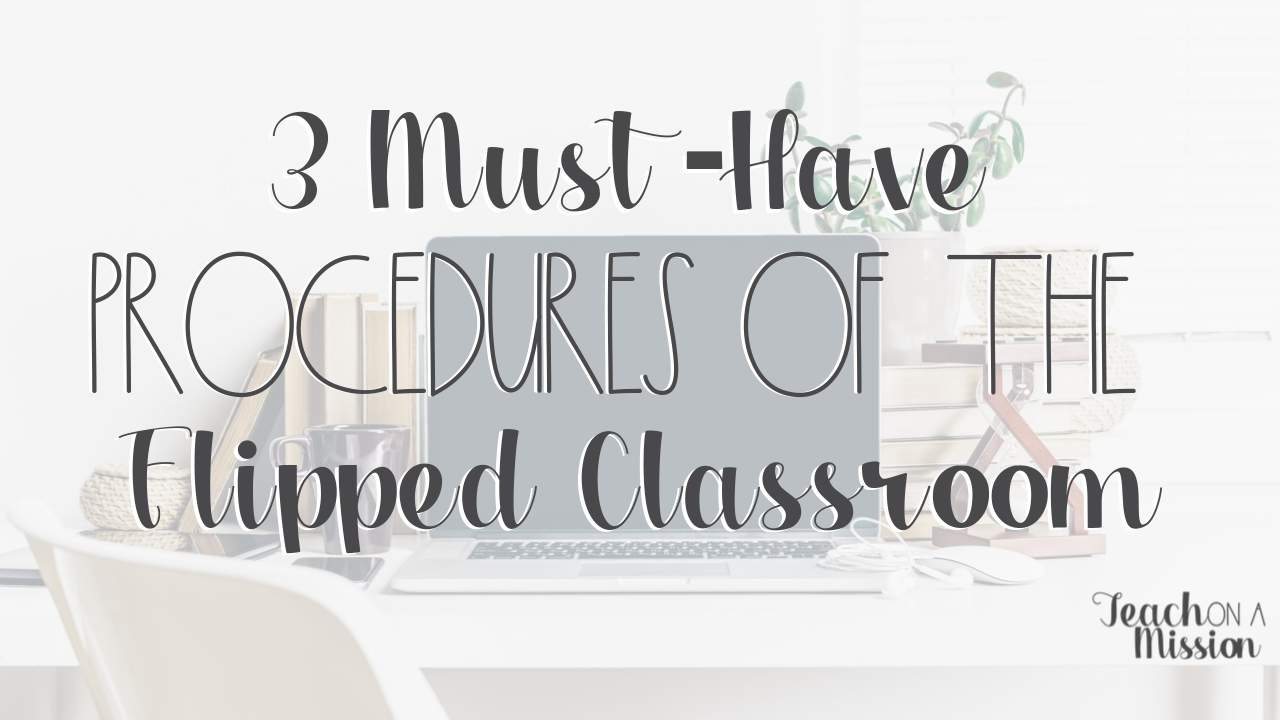
This week I want to be sure that I'm giving you as much practical flipped classroom strategies as possible. No matter the flipped classroom model you choose (which you can learn about in the Ultimate Flipped Classroom Starter Kit here), you want to rely on solid procedures in your class.
In this post, I will be bringing you the major three themes and desires behind procedures I had in my classroom, and what I recommend to all of the teachers in my online course, Flipped Classroom Formula. These are absolute musts for any thriving flipped classroom.

1. Student Content
In my online course, Flipped Classroom Formula, there is an entire MODULE on just this topic... student content and what that looks like. Here's the big secret... student content is NOT your videos.
Shocker, I know.
Here's the thing, you HAVE to have a procedure for what your students will be doing when they watch your videos. You can't just leave them out for the wolves and hope they make it through. Nope, y...
3 Unforeseen Wins of the Flipped Classroom

Ten or so years ago when I decided to flip my classroom the reasons why I wanted to flip were very clear. Crystal clear.
From wanting to do more than just lecture all day to increasing student accountability and ownership over their learning, I knew the flipped classroom model would get me closer to those goals. I could go on and on about finding and solidifying your WHY for flipping, and I give most commons reasons why in this post, but it's something we dive deeply into in my online course where I walk teachers through, step-by-step how to flip their classroom, called the Flipped Classroom Formula.
I won't spend time in this post talking about reasons to flip because, I'm betting, you know what those are. And if you don't know them for sure, you do have some idea of why you're looking into this whole flipping thing, and I want to help you solidify and optimize those reasons if you become one of the teachers who joins me in the Flipped Classroom Formula.

This post is all about...
5 Myths You Can STOP Believing About the Flipped Classroom

The flipped classroom has been around for probably close to 15 years. In the education realm, it's not a brand-new concept, but it is one that is gaining traction with more and more teachers because of the many ways it can improve classroom engagement and the performance of students.
However, there are quite a few misconceptions about the flipped classroom that prevent teachers from even considering it. In this post, I want to flush out those misconceptions so that teachers can consider flipping for what it truly is.

1. It takes too much TIME.
First thing's first. Let's start with the big one. I like to address the elephant in the room, and this is definitely one of them. Here's why... because it does take time. Flipping your classroom very much takes time to craft and master. But here's the thing - it's not that it take more time, it is a trade off in time spent.
The big goal of the business world is to be cognizant of and have a fantastic return on investment (ROI), righ...
AP® Psychology Resources - A One Stop Shop
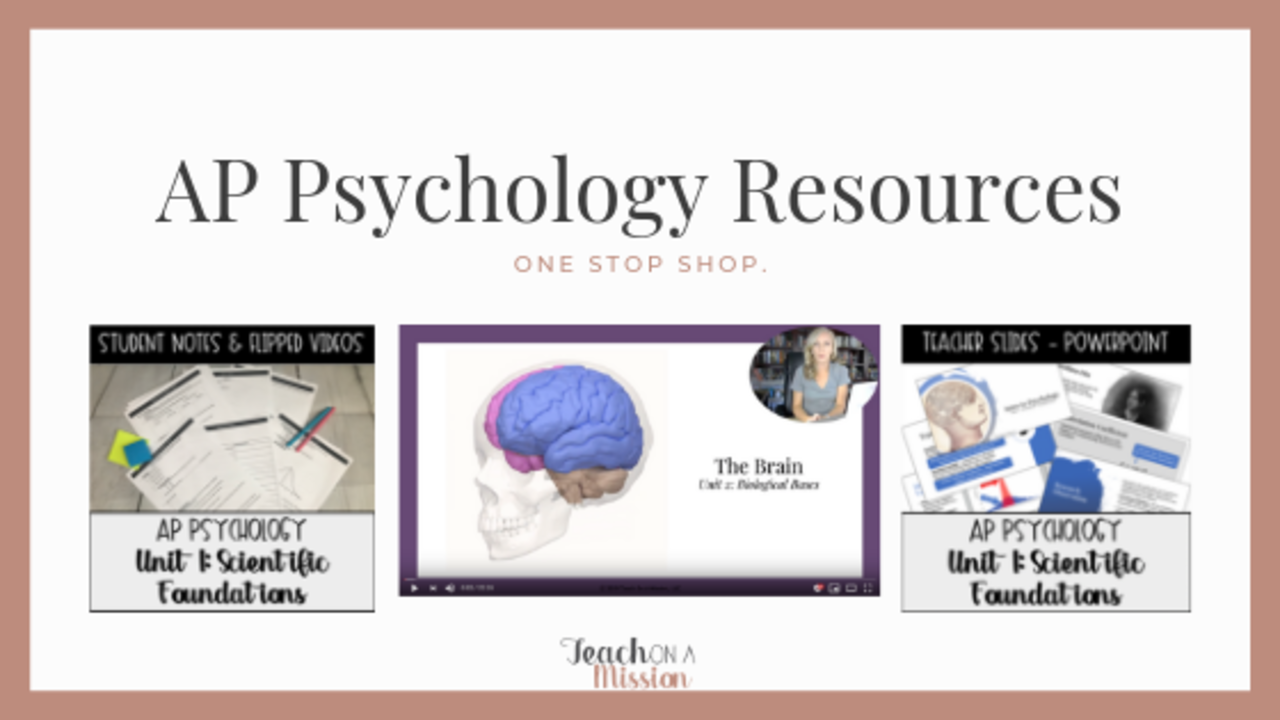
My goal in writing this post is to provide to you as many resources as I can that are a combination of paid and FREE AP® Psychology teaching resources.
A little introduction first...
I've been teaching AP® Psychology for almost ten years now since I started teaching in 2010. It is SUCH an awesome course that I think ALL students can benefit from, but it's unique because we aren't in the course just to have fun. Students are there to do well on the test that many of them will pay for, but otherwise still want to do well on to earn that college credit in May.
So, we've got to deliver for them on every unit.
Let me take you through each of the AP® Psychology resources below, each of which you can click and check out for yourself. If you feel so inclined to share these on social media, it would possibly help reach another teacher who is looking for support whether that be in just knowing the content, or having ready made resources.
YouTube
A while back I flipped my AP® Psycholo...






